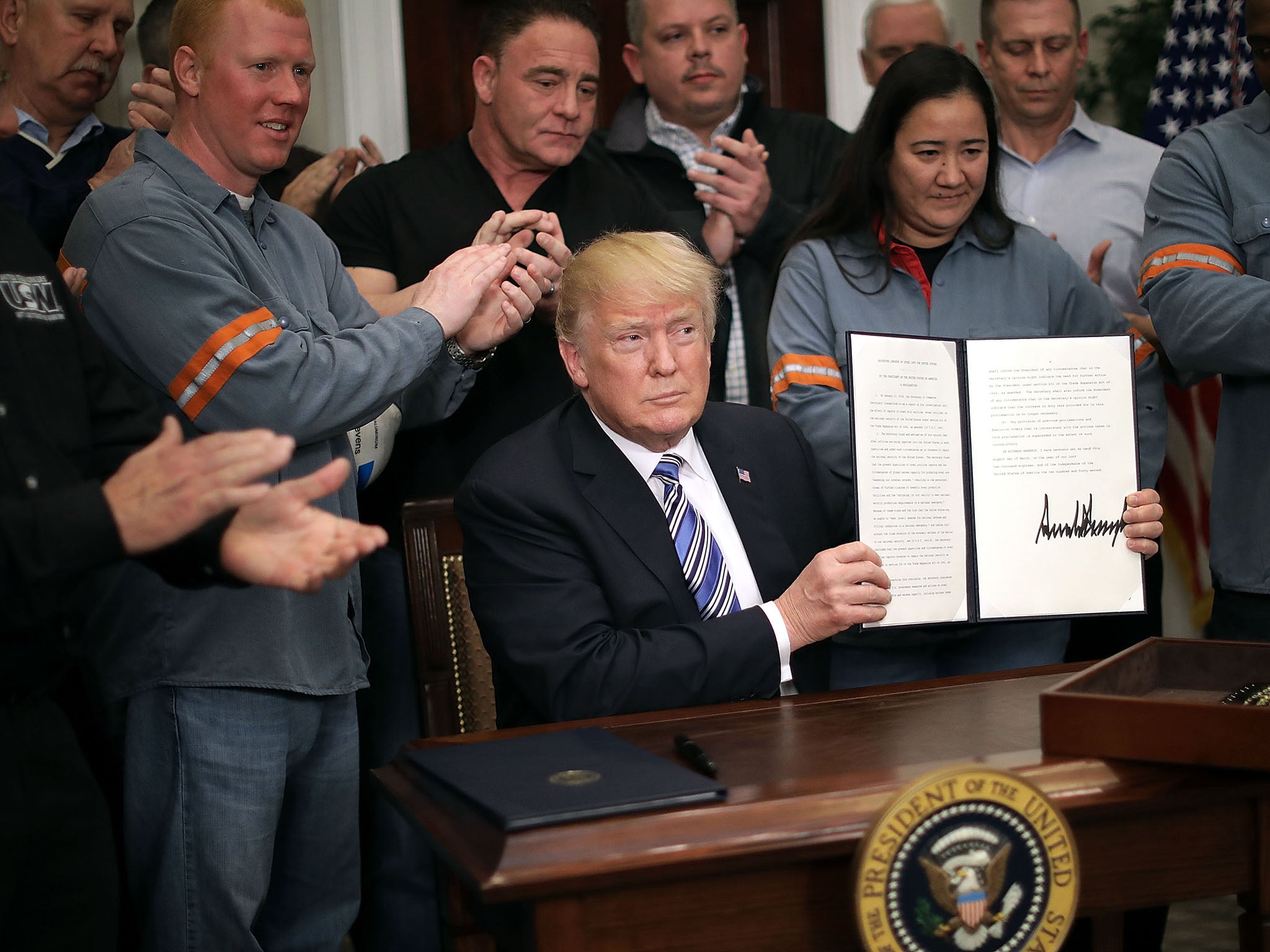Blacklisted Russian firm wins, and then loses a break from Trump's aluminium tariffs
Competitor had meant to object but fluffed the paperwork, say authorities as they reverse decision

Your support helps us to tell the story
From reproductive rights to climate change to Big Tech, The Independent is on the ground when the story is developing. Whether it's investigating the financials of Elon Musk's pro-Trump PAC or producing our latest documentary, 'The A Word', which shines a light on the American women fighting for reproductive rights, we know how important it is to parse out the facts from the messaging.
At such a critical moment in US history, we need reporters on the ground. Your donation allows us to keep sending journalists to speak to both sides of the story.
The Independent is trusted by Americans across the entire political spectrum. And unlike many other quality news outlets, we choose not to lock Americans out of our reporting and analysis with paywalls. We believe quality journalism should be available to everyone, paid for by those who can afford it.
Your support makes all the difference.Hundreds of companies have asked the Trump administration for a special break from its sweeping aluminium tariffs. Few have succeeded. One that managed to get an exemption is a Russian firm currently subject to Treasury Department sanctions.
How Rusal America – a branch of a Russian metals giant controlled by an oligarch with close ties to president Vladimir Putin – managed to win an exclusion highlights the chaotic and unwieldy process surrounding president Donald Trump’s tariffs.
While Rusal and its controlling stakeholder, Oleg V Deripaska, are restricted by US sanctions, one of the company’s dozens of exemption requests was granted by the Commerce Department in July, apparently for the simple reason that no US manufacturer objected.
Department officials reversed the decision this week, after concluding that an American aluminium manufacturer had meant to object, but made a mistake in its paperwork.
Rusal is an unlikely company to win an exemption. Mr Deripaska, its major shareholder, was blacklisted by the US in April as part of an effort to punish members of Putin’s inner circle for interference in the 2016 election and other Russian aggressions. Mr Deripaska and six other wealthy Russians were hit with sanctions that restricted their ability to travel to the United States or do business with any company in the West. As part of that effort, Rusal and other entities were also constrained from engaging in transactions with western companies.
Despite the cloud of sanctions, Rusal filed more than 100 requests for exclusions that would allow it to import aluminium products from its Russian parent company to produce furniture, portable ladders and other goods. An American aluminium titan, Century Aluminium, filed objections to all but a few of those requests.
Rusal’s first 19 requests were denied by Commerce Department officials. In late July, its 20th request was granted. To date, Commerce Department officials say they have never approved a request that another company objected to properly.
Democrats in congress who noticed the exclusion were prepared to protest what they called suspicious timing, given that the exemption coincided with Trump’s summit meeting with Putin in Finland.
Commerce Department officials dismissed that criticism last week, saying they had coordinated with the Treasury Department unit that oversees sanctions in considering the Rusal application. The officials said that unit, the Office of Foreign Assets Control, was ultimately the decider on whether sanctions should prevent approval of an exclusion.
Treasury officials, however, denied that they had played a role in the exclusion request.
The Commerce Department “implements authorities that are separate and distinct from sanctions implemented by Treasury’s Ofac,” a Treasury spokesman said in an email. “This was a Commerce Department decision, and we were not specifically consulted.”
The Commerce Department said that the approval review lasted 12 weeks, and that “there were no objections posted by American companies for the approved request” during the month long comment period.
“The Commerce decision on this exclusion request simply acknowledges that this product is not available from US manufacturers,” a department spokesman said.
This week, the department reversed course on the exclusion, after The New York Times inquired about whether Century Aluminium had, in fact, filed an objection, given its pattern of objecting to nearly every other Rusal application. Department officials determined that Century had meant to file an objection to Rusal’s request, but had erred in submitting the paperwork. The department effectively fixed Century’s error, then ruled that the objection was valid – and that Rusal’s exclusion was void.
In light of Century’s “clear intent to file the required objection form, not completed due to its clerical error,” the department said in a statement, officials have now “considered the objection on its merits and determined it supports a denial”.
Rusal officials declined to comment on the issue this week. “Thank you for your interest in our company,” a spokesman, Andrey Vetvinskiy, wrote in an email. “Unfortunately, we will not be able to arrange an interview with our top management this month.”
The Commerce Department’s reversal has raised new questions from Democrats, including representative Lloyd Doggett of Texas and senator Elizabeth Warren of Massachusetts, who say the department should have never considered granting an exclusion to a company under sanctions in the first place.
The New York Times
Join our commenting forum
Join thought-provoking conversations, follow other Independent readers and see their replies
Comments